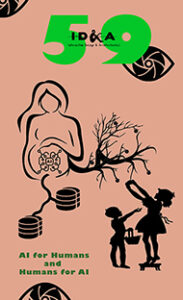(https://doi.org/10.55612/s-5002-059)


Vânia P. Almeida Neris
is an associate professor working for the Department of Computing at the Federal University of São Carlos, in Brazil, where she leads the Flexible and Sustainable Interaction Lab. She received her Ph. D. in Computer Science from the University of Campinas (BR), has conducted research at the University of Reading (UK), and was a visiting scholar at George Mason University (USA). Her research interests include emotion-aware systems and computing technology for well-being.

Tais Bleicher
is an assistant professor working for the Department of Psychology at the Federal University of São Carlos (UFSCar), Brazil. She received her D.Sc in Public Health from in a broad association of Federal University of Ceará, State University of Ceará and University of Fortaleza, with a doctoral degree in Social Psychology at the Complutense University of Madrid. Her research interests include Public Policies, Public Health, Psycosocial Care, Student Assistance.

Vanessa de Cássia Alves
is a bachelor’s student in Computer Science at the Department of Computing at the Federal University of São Carlos, in Brazil, where she carries out research in the area of Human-Computer Interaction (HCI). Her research interests include Software Engineering and Web and Mobile Development.

Luciano de Oliveira Neris
is an assistant Professor working for the Department of Computing at the Federal University of São Carlos (UFSCar), Brazil. He received his D.Sc in Electrical Engineering from the University of São Paulo (BR) and was a visiting scholar at George Mason University (USA). His research interests include embedded systems, unmanned aircraft systems, assistive technology, and wearables.

Müge Develier
research assistant in Antalya Bilim University, has worked in various design offices after she completed two bachelor degrees, architecture and interior architecture. During and after her education she won awards by participating in architectural design competitions individually and with different teams. After she completed her master’s degree about architectural design, she began her doctoral studies. Her personal studies focus on artificial intelligence on design.

Irina Engeness
is professor of Education. Her research interests include learning and teaching with digital technologies in classrooms, in online environments and the cultural-historical theory. Engeness has examined how students interact with various digital resources in online environments to develop their understanding of the target concepts and their capacity to learn online. For the time being, Engeness leads a Research Project: Artificial Intelligence (AI) for Assessment for Learning (AfL) to Improve Learning and Teaching in 21st Century (AI4AfL) – Prosjektbanken (forskningsradet.no)

Gerhard Fischer
is professor emeritus of Computer Science, a Fellow of the Institute of Cognitive Science, and the founder and director for Lifelong Learning and Design (L3D) at the University of Colorado at Boulder. He is a member of the Computer-Human Interaction Academy (CHI; 2007), a Fellow of the Association for Computing Machinery (ACM; 2009), and a recipient of the RIGO Award of ACM-SIGDOC (2012). In 2015, he was awarded anhonorary doctorate from the University of Gothenburg, Sweden. His long-term research agenda is focused on quality of life in the digital age, meta-design, cultures of participation, lifelong learning, social creativity, distributed cognition, and design trade-offs.

Siv Gamlem
is a professor of Education at the Faculty of Humanities and Teacher Education, Volda University College, Norway. Gamlem’s research is related to assessment, feedback, learning processes and professional development. In addition to research, Gamlem is a lecturer at Teacher Education and supervisor for doctorate- and master student

Franco Eusébio Garcia
is a programmer. He received his Ph. D. in Computer Science from Universidade Federal de São Carlos (UFSCar). He would rather write code than this biography.

Vivian Genaro Motti
is an associate professor in the Department of Information Sciences and Technology at George Mason University, in the United States. Her research interest is on Human Computer Interaction and Wearable Computing. She leads the Human Centric Design Lab. She received her Ph. D. in Science Engineering from the Catholic University of Louvain.

Gülay Hasdoğan
is the head of the Department of Industrial Design at Middle East Technical University. She holds a BID in Industrial Design and an MSc in Building Science from METU, as well as a PhD from Central Saint Martin’s College of Art and Design. She teaches graduate research methods and second year industrial design studio. She has publications on institutionalisation of industrial design, design education and user models in design process.

M. Uğur Kahraman
asst. professor in Antalya Bilim University has worked as an implementation supervising interior designer. He was involved in a commercial partnership to design and manage. With an Australian Master of Design degree and a PhD in progress, he involved in multidisciplinary research. His personal studies focus on neuro design and design education.

Ingeborg Krange
is professor in Educational Sciences and faculty member at Teacher Education and Languages at Østfold University College, Norway. Krange has in more than two decades been working with design, development, and use of digital resources for the purpose of learning and teaching. She works with qualitative methods to explore the transformational role of technologies in knowledge practices. She has several publications in leading international journals. Krange is head of the research group RIDE – Research in Digital Education.

Tiina Leino Lindell
has been a postdoctoral researcher since 2023 in the Department of Applied IT at the Faculty of IT, University of Gothenburg. Her research interests center around understanding how digital technologies can be utilized in schools and how organizations can develop their competence in this area based on their specific needs. Tiina completed her doctoral studies at the Royal Institute of Technology (KTH) in 2022, where she focused on the professional development of technology teachers. Her theoretical interests primarily lie in cultural-historical activity theory, and she employs qualitative research methods in her work.

Johan Lundin
since 2018 is full professor in Informatics with orientation towards learning at the department of applied IT, faculty of IT at University of Gothenburg. He holds a MSc in informatics (2000) and a Ph.D. in informatics (2005) from University of Gothenburg, Sweden. In 2018 Johan was appointed as vice head of department with special responsibility for research and PhD education, at the department of Applied IT, University of Gothenburg In 2018 Johan was appointed Guest Professor at University West, Trollhättan, Sweden. In 2020 Johan was elected chairman of the board for the national research network GRADE, organising the three national graduate schools, (GRADE, UPGRADE and LIKED). In 2022 Johan was appointed to the committee for Educational Sciences at the Swedish Research Council.

Helena Medeiros Caseli
is an Associate Professor working for the Department of Computing at the Federal University of São Carlos, in Brazil, where she leads the Computational Linguistics and Intelligence Lab. She received her Ph. D. in Computer Science from the University of São Paulo (BR) and has more than 20 years working with Natural Language Processing (NLP). Her research interests include NLP systems and resources and machine learning.

Augusto Mendes
is a Master’s student at the Federal University of São Carlos, in Brazil, researching under Helena Caseli’s supervision at the Computational Linguistics and Intelligence Lab. His research interests include NLP systems and resources, multi-task learning and meta-learning.

Synnøve Moltudal
is Associate Professor at Volda University College, where she is a member of the Learning and Assessment research group. Moltudal mostly work with mixed methods- and design-based approaches to educational research. Her research interests include teaching, learning processes, feedback, and assessment, with a main focus on learning environments where digital technologies are used.

Conrado Saud
is a Master’s student in Computer Science at the Department of Computing at the Federal University of São Carlos (UFSCar), Brazil, with a research focus on Human-Computer Interaction (HCI). His research interests include the development and research of computational systems and infrastructures integrated with mobile sensors.

Meerita Segaran
is Researcher II, PhD at Østfold University College, Norway, in the Department of Pedagogy, Learning, and ICT. She works on the Artificial Intelligence Assessment for Learning (AI4AfL) project funded by the Norwegian Research Council. Segaran’s research is centered on Artificial Intelligence and Education (AIED), Technology Enhanced Learning (TEL), feedback, formative assessment, and cultural-historical perspectives of learning. Segaran’s work is driven by a passion for integrating technologies with educational practices to improve learning processes and outcomes.

Yaren Şekerci
completed her PhD in 2023. She focused her PhD specialization on accreditation in interior architecture education. She is a lecturer at Antalya Bilim University Faculty of Fine Arts and Architecture, Interior Architecture and Environmental Design Department. In the department, she teaches design studio and technical drawing.

Marie Utterberg Modén
has been a postdoctoral researcher since 2022 in the Department of Applied IT at the Faculty of IT, University of Gothenburg. She is interested in how information technology changes the conditions and possibilities for education. Her research focuses on theoretical, methodological, and practical considerations surrounding platformization, artificial intelligence, and digital textbooks. Marie completed her doctoral studies at the University of Gothenburg in 2021, where she concentrated on the teacher practice of digital mathematics textbooks. Her theoretical interests primarily lie in cultural-historical activity theory and also draw on platform studies and infrastructure studies. She employs qualitative research and participatory design methods in her work

Abdullah Tarik Celik
is a research assistant and a PhD student at the Department of Industrial Design at Istanbul Technical University (ITU). His research interests include human-computer interaction, design fiction and post-humanist design. He received a BSc from ITU Industrial Design and MSc from Middle East Technical University Industrial Design Department.
